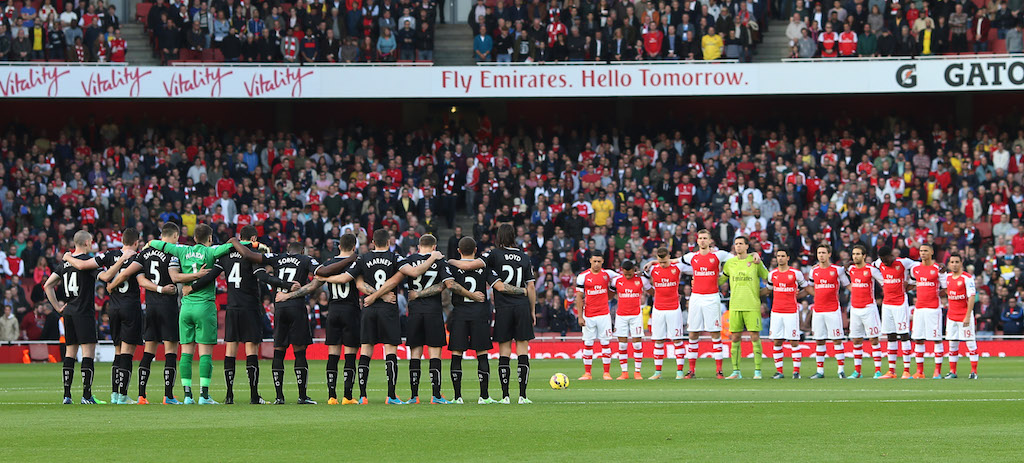Update: Today marks Armistice Day ahead of Remembrance Sunday.
Layth Yousif’s long-form feature analyses the contribution made by Arsenal players to war efforts with the spotlight on a Welshman who tragically would never see the marbled halls of Highbury again.
....
What candles may be held to speed them all?
Anthem for a Doomed Youth, Wilfred Owen
Englefield Green in Surrey looks over Runnymede Meadow, where the Magna Carta was signed by King John in 1215 – proclaiming no ‘free-man shall be punished except through the rule of law’.
To the left Windsor Castle can be viewed. The magnificent stone structure built after the Norman Invasion - the last time this island was invaded - stands as proud adjunct to the fact. The glorious Thames flows serenely by, adding to a timeless pastoral scene.
On nearby Coopers Hill Lane stands a sturdy but understated white Grade 2 Listed building. Inside is engraved glass and painted ceilings which underscore its reason for being, namely, to honour. It is known as the Air Forces Memorial, more commonly called the Runnymede Memorial.
Lovingly and expertly engraved onto its snowy stone walls are the names of 20,456 men and women who served and were lost, presumed dead, in air operations during World War Two. The names are carved into perpetuity because they have no known grave anywhere in the world, the majority of these doomed souls lost without trace.
On one such wall, a hero amongst thousands, is the humble mention of Flight Sergeant Daniel, Robert, Norman, Victor. Service No: 1318026, Date of Death: 24/12/1943 Age:21 Regiment/Service: Royal Air Force Volunteer Reserve 156 Sqdn.
Bobby Daniel.
A son of William and Cissie Daniel, of Plas Marl, Swansea. Welsh Cap for Association Football.
Arsenal Footballer.
The roof of the Runnymede memorial looks out over vast swathes of the London metropolis.
On a clear day, if you’re lucky, you can also see Wembley Stadium.
*****************
The Daniel family lived in a part of the director’s house at the British Mannesmann Tube Company Limited steelworks where father William was a storeman. The Liberty Stadium, home of Swansea City Football Club, is now located on the site of the works.
Bobby Daniel soon showed an aptitude for football winning a schoolboy cap for Wales in 1938 aged 16. Soon after, Arsenal, one of the most well-known teams in world football in the 1930s, snapped him up, eager to extend their hegemony of the decade into the 1940s.
Unfortunately, the Second World War put paid to that, along with a million other peacetime dreams as sport became secondary to defeating totalitarianism and National Socialism.
Arsenal, for their part, lost nine of the 42 professionals on their books when war broke out at the start of the embryonic 1939/40 season – which was the highest casualty rate suffered by any English league club.
The club had traditionally sent men to war to defend their country.
At the outbreak of the First World War, with The Gunners only a year on from their Woolwich Arsenal roots – having left South London for N5 in 1913 – players joined up or worked in munition factories; an act which provided a fitting link to the club’s early antecedents.
James Maxwell, Woolwich Arsenal’s outside-right for 1908-09 fought with the Royal Scots in Northern France before losing his life on September 27th, 1915. Another player, Spencer Bassett, who had turned out for the club for four years from 1906-1910, died on the Western Front on April 11th, 1917.
A third player, Leigh Roose, who played in Arsenal colours during 1911-12, joined the Royal Army Medical Corps. He was mobilised to France, serving in a hospital in Rouen helping soldiers wounded on the Western Front before he was transferred to the Evacuation Hospital at Gallipoli in April 1915. Roose then joined the 9th Battalion of the Royal Fusiliers, and in 1916 he was sent to Western Front near to the village of Dainville. In August of 1916 he was awarded the Military Medal for bravery whilst at the Battle of the Somme. The citation, in the curiously mesmerising manner of pared back military language told of him lobbing “bombs until his arms gave out…joining the covering party, [where he] used his rifle with great effect”.
Tragically, Leigh Roose lost his life on October 7th, 1916 during an attack on German positions at Gueudecourt. A man named Gordon Hoare, who before the war had played for England as an amateur, witnessed Roose charging at the enemy in No Man’s Land, whilst shooting at them. A short while later, another soldier caught sight of a motionless Roose in a bomb crater. His body, like so many thousands of young valiant men was never found.
So it was with a sense of honour that Arsenal men signed up for service during World War Two.
This time the majority of red and white heroes signed up with the Royal Air Force. This gallant list included legendary forward Ted Drake – who would surely have set a goalscoring record for the Gunners even Thierry Henry would not have matched had the War not taken seven prime years of his career. (As it was his 139 in 184 games sees him stand fifth on the club’s all-time scoring list even now).
Jack Crayston, Eddie Hapgood, Leslie Jones, Bernard Joy, Alf Kirchen, Laurie Scott and George Swindin were the other first team members who got jobs as Physical Training instructors, whilst the immortal Dennis Compton (Arsenal, Middlesex and England) saw action in India. Incidentally, it was in India that Compton began his close friendship with his Australian counterpart, Test cricketer and ‘Australian in exclesis’ in Neville Cardus’s moving words, namely Keith Miller who served in England with the RAAF during the war – and who once famously growled when asked about the pressure of playing a Test match: “That’s not pressure – pressure is having a Messerschmidt up yer arse”.
Others Gunners to see action abroad were Bryn Jones in Italy, Reg Lewis in Germany and Ted Platt in North Africa. Tom Whittaker, the Arsenal trainer, was also a Squadron Leader, later being awarded the MBE for the part he played on D-Day on June 6 1944.
During the Blitz, hundreds of Islington locals sought safety at Arsenal tube station. Dear old Highbury itself proudly became part of the War effort too as it was employed as an Air Raid Patrol Centre. The evocative stadium was bombed by German fighters in 1941 which saw the North Bank reduced to rubble after a fire broke out resulting in its roof collapsing. (Also putting the North Bank goalposts out of action.) The majority of the Clock End terracing was also damaged in the raid.
Another, earlier German bomb, whose weight was estimated at 1,000lb, had been dropped near the ground in October 1940. Tragically, a number of RAF men had congregated in a hut which was destroyed leaving two of their number dead. The force of that huge bomb saw many tonnes of concrete blown onto the Clock End terraces.
Heartbreakingly, Arsenal players in the RAF who died included Sidney Pugh, Harry Cook and Leslie Lack.
Lack, in wretched timing, was killed by ‘friendly-fire’ when returning from a mission in his Spitfire, and is also remembered at Runnymede as ‘Royal Air Force Volunteer Reserve… Son of James George and Daisy Mary Lack, of Clerkenwell, London.’
A triumvirate of Gunners players who joined the Royal Fusiliers also made the ultimate sacrifice. Hugh Glass was drowned at sea in 1943, Cyril Tooze was killed by a sniper in Italy in February 1944 and Herbie Roberts, an Arsenal regular during the club’s hat trick of League Championship successes from 1932 to 1935, died of erysipelas, a horrific skin condition in June 1944.
Another, Bill Dean, a keeper who played for Arsenal in wartime fixtures and who told friends proudly in a line which should resonate with all Arsenal supporters to this day: “Well. I have fulfilled my life’s ambition. I have played for The Arsenal.” Dean sadly died in action with the Royal Navy in March 1942.
The last one on that terribly sad Arsenal litany was Bobby Daniel. Daniel was a Flight Sergeant Gunner in the RAF serving on a Lancaster bomber.
The Lancaster bomber has been described as the aircraft that helped win the Second World War for Great Britain. Yet the average number of days a man was expected to survive for any one of the seven flight crew who served on each craft that numbered in the tens of thousands was exactly the same as it was for a World War One infantryman: 22 days.
The Lancaster was employed to drop ordnance on the industrial cities of the Ruhr, it was used in the daring Dambusters raids and it was used to destroy German V2 making factories in the Baltic. These terrifying bombs better known as Doodlebugs could have changed the course of history had they not been destroyed in such large numbers thanks to Lancaster raids.
Stories abounded of the valour and heroism of the Lancaster flight crew. One particular sortie saw a plane shot down in artic conditions. A crewman fell 20,000 feet through the air without a parachute but landed on a snow covered tree and miraculously survived. A rear Gunner on another night flight had his cockpit shot to pieces and held onto the craft with both arms, flying through the air at 300mph until it landed, damaged but in one piece back in Lincolnshire.
One crew member, when spotting a fire in one of the engines as a result of German flack simply tied himself to a rope secured to the inside of the plane and walked out onto the wing to put the fire out, thereby saving his craft and his colleagues’ lives.
Bravery, gallantry and modesty abounded even if nearly 75 per cent of all crewmen died flying Lancasters during World War Two.
These men were truly the bravest of the brave.
On one such flight on Christmas Eve 1943, 21-year-old Bobby Daniel, Flight Sergeant Gunner and footballing Gunner climbed into his Lancaster with the rest of the boys in their seven man team. It was to be the last time they ever set foot on British soil.
Their mission to this day is still shrouded in uncertainty. Some reports say they were to fly to Berlin to drop their bombs, other accounts state they were on a secret mission to Czechoslovakia.
Whatever the destination, what we know is that Bobby and his valiant lads on a cold, dark, miserable night, with snow in the air – when during peacetime they would have been warm in the company of their loved ones, friends and family preparing to look forward to Christmas Day, and in Bobby’s case more than likely play a game of football for his beloved Gunners – were shot down somewhere over Western Europe with all seven men on board losing their lives.
Neither the plane, nor their bodies were ever seen again.
That is why the Runnymede Memorial, Englefield Green, on panel 136 of that elegant white stone structure, modestly displays the name of Flight Sergeant Daniel, Robert, Norman, Victor. Service No: 1318026, Date of Death: 24/12/1943, Age:21 Regiment/Service: Royal Air Force Volunteer Reserve 156 Sqdn.
Son of William and Cissie Daniel, of Plas Marl, Swansea. Welsh Cap for Association Football.
And Arsenal Footballer.
As we commemorate VE Day spare a thought and say a silent prayer for all those brave souls who fought for our country in World War Two, not least those with no known grave who are commemorated at Runnymede – it is the very least such unsung heroes deserve from us all in honouring their ultimate sacrifice.
They shall grow not old, as we that are left grow old:
Age shall not weary them, nor the years condemn.
At the going down of the sun and in the morning
We will remember them.
They mingle not with their laughing comrades again.
Ode of Remembrance.
This article originally appeared in Issue 5 of The Football Pinkmagazine








